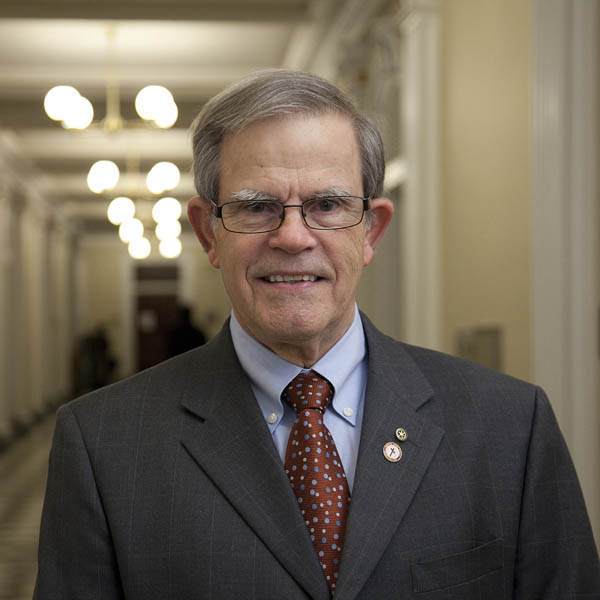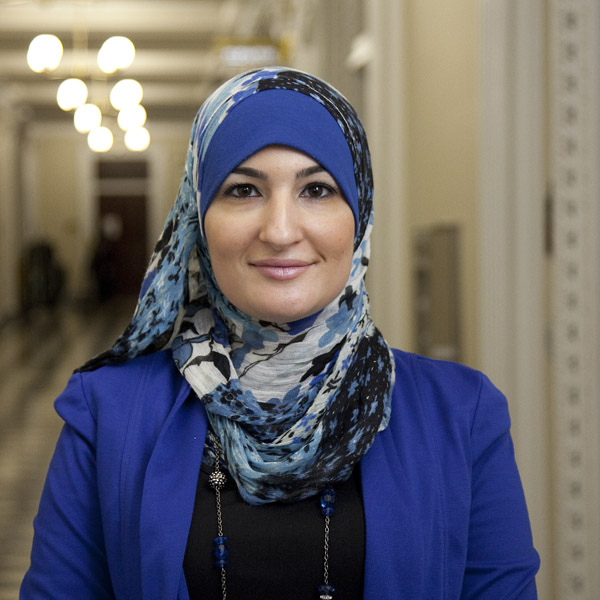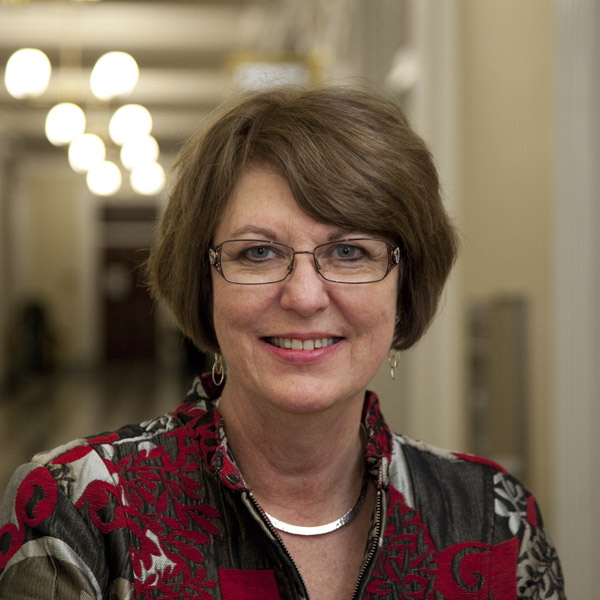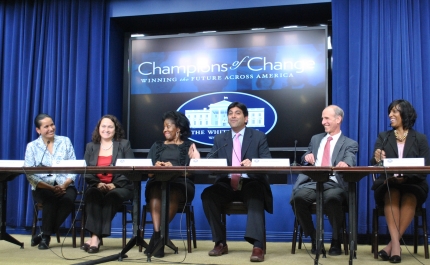Champions of Change Blog
Champions of Change: A Latina in STEM
Posted by on January 5, 2012 at 2:52 PM EDTA dear friend of mine watched the live webcast of the “Champions for Change” panel. Afterwards she said to me, “Judit, you seemed so happy during the discussion. You smiled often. Were you looking at someone in the audience?”
I actually was. I was looking at two women who have inspired me for many years: Dr. Lydia Villa-Komaroff, a founding member of SACNAS and Dr. Yvonne Rodriguez, our Director of Programs. Having Lydia and Yvonne at the “Champions of Change” event was incredible—a way to honor both those who have come before and those who are leading the way.
The “Champions for Change” event was the first time that I have been recognized for my work as a woman working on behalf of women of color in STEM and an important step in my life as a woman, activist, leader, and mother. It also created a space at the national level for the continued and pressing dialogue about women in the STEM workforce. We are still a long way from parity in terms of representation of women in all fields of science, science leadership positions, salary equity, and in developing a healthy work/life balance. (I commend the National Science Foundation’s efforts in this direction with their Career-Life Balance Initiative.)
Learn more aboutBe Ready When Disaster Strikes
Posted by on January 1, 2012 at 2:00 PM EDT
It has been my pleasure to serve as the Executive Director of the Be Ready Alliance Coordinating for Emergencies (BRACE) since its founding in 2006. Thirty-two years of service with the American Red Cross and then as the Escambia Long Term Recovery Coordinator following Hurricanes Ivan & Dennis provided great preparation for supporting 450 Partners as we strive to make our community the most disaster resilient in America. We provided survivors of Hurricanes Ivan & Dennis with over $1.3 Million in housing assistance after the end of the FEMA temporary housing mission. BRACE donated modular housing to 88 pre-disaster renters allowing them to realize the American Dream of home ownership.
In the anxiety provoking hours prior to landfall of Hurricane Ivan in 2004 over 85 first responder employees of Escambia County, the City of Pensacola and Escambia Sheriff’s Office learned that their plans for the care of their children had failed. They faced the terrible choice between caring for their children and probably losing their jobs or reporting to their emergency duty station and deserting their children. We are working with over a dozen BRACE Childcare for First Responder Partners to ensure first responders in our community never face that choice again. The BRACE coordinated Childcare for First Responders shelter ensures that emergency workers may give their full attention to disaster duties knowing that their children are in a safe environment, supported by experienced childcare professionals, well fed and secure.
We have been supporting efforts by government at all levels to establish a culture of preparedness. BRACE has conducted two Youth Emergency Preparedness (YEP!) expos during National Preparedness Month (September). Those expos have allowed BRACE to reach an audience of over 90,000 residents with disaster and emergency preparedness messaging thanks to the support of BRACE’s many media partners. The expos engaged over 800 youth in interactive, educational activities designed as service learning opportunities. In March 2011 BRACE introduced the Teen Community Emergency Response Team (CERT) curriculum at Escambia County High School, training 43 youth in emergency preparedness, fire safety, first aid, light search & rescue and other skills that will allow them to be support safety efforts at their school. We have met with principals of every public high school in the County to make the Teen CERT curriculum available throughout the entire county.
Learn more aboutThinking Outside of the Box to Engage Individuals in Community Service
Posted by on December 20, 2011 at 10:30 AM EDT I have always been inspired by leaders of our great nation and thus I am honored to be a White House Champion of Change. Upon reflecting about what service means to me for this event, I began to realize that service has struck my life in a multitude of ways. Community service is one of the most powerful tools we have because the resources one can provide their fellow human are infinite.
I have always been inspired by leaders of our great nation and thus I am honored to be a White House Champion of Change. Upon reflecting about what service means to me for this event, I began to realize that service has struck my life in a multitude of ways. Community service is one of the most powerful tools we have because the resources one can provide their fellow human are infinite.The ways in which we participate in community service must transcend the traditional forms of how we serve others. Soup kitchens and food banks are incredibly important to providing emergency services to people in need and could not operate without the support of volunteers. However, we also must highlight other forms of service that play an integral role in overcoming the reasons people resort to emergency resources. Mentoring or speaking to at-risk youth, providing IT support to non-profits, and educating ourselves about why challenges like food insecurity and social injustice exist are examples of uncomplicated approaches that support our communities. Encouraging a proactive, outside the box approach to service is critical to aiding communities in need, and in turn, combating many of the challenges our nation faces today.
My own story of service began in January 2007, when I traveled with a group of 11 people from St. Michael’s College to New Orleans to assist in the post-Hurricane Katrina relief efforts. At the onset of the trip, I was excited for the opportunity to travel to a new part of the country to do community service, but completely unaware of the impact this weeklong service trip would have on my life. During the week I served in New Orleans, I worked alongside others to clean the homes of two elderly people who had relocated after the storm. I was left with a daunting visual of the challenges our nation faces, but also met with a new found energy and interest in service.
Learn more about Service'Giving a Hand Up Not a Hand Out:' Helping People Get Back on Their Feet
Posted by on December 19, 2011 at 6:15 PM EDT
I am honored to be considered a “Champion of Change,” representing Central Union Mission in Washington, DC. Help for homeless and poor people has not changed much since the privately funded Mission began 127 years ago—clean beds, nutritious meals and hot showers will always be required. We continue to provide a clean, safe and polite overnight facility for men, as well as food, clothes and other necessities for families and children. What is changing, however, is the scope of our guests’ needs and how we address them. I can best explain our efforts toward wholesome change at our historic institution by introducing some of my partners in change.
I invited Dr. Jorge De Casanova to join the Mission staff in 1998 to open our services to the rapidly growing Hispanic community. We studied the community and began by offering a Bible study and sharing food and clothing. Word spread, and the Hispanic Family Ministries has grown to include over 300 families. Pastor Jorge challenged some preconceptions: classes in English literacy often need to begin with Spanish literacy. We need citizenship classes, but some need emotional and career counseling first. To offer vocational training, we incorporate testing and partner with other agencies for job experience. Free clothing, food and furniture ease the financial burden on under-employed families. Through this Ministry, hundreds of children receive school supplies so they can succeed, summer camp experiences that help them mature and Christmas and Easter presents that show them how much they are loved.
Connecting the Dots
Posted by on December 19, 2011 at 4:45 PM EDT
This week I am being recognized as a Champion of Change for my work empowering Arab and Muslim Americans nationally through civic engagement, direct service and advocacy campaigns. Born in Brooklyn, New York to parents who emigrated here from Palestine and attending NYC public schools my whole life, I would say I was an ordinary kid with an ordinary life.
September 11th, 2001 was the most tragic day our country has ever faced and a day that has changed and reshaped who I am and determined the work I choose to do. In a matter of one day, I went from being an ordinary Brooklynite, New Yorker to one who shares a religion and ethnicity with terrorists. Growing up, my dream was to be a high school English teacher and to work in inner city schools to teach young people how to express their lives, their challenges and aspirations through writing. I hope that I will still venture on this endeavor in the future.
Two months after 9/11, I began volunteering in the Arab American community in Brooklyn which began my career as a local and national organizer. As the Advocacy and Civic Engagement Coordinator for the National Network for Arab American Communities (NNAAC), I am able to connect communities to resources and to each other. The National Network for Arab American Communities is a network of 22 Arab American organizations in 10 states, including the District of Columbia. We work to build the capacity of local community based, grassroots organizations so that they can better serve, empower, represent and engage their constituencies in addressing challenges and issues they are facing in their local communities.
Learn more about ServiceContributing Even the Slightest Bit Can Positively Impact Hundreds of Lives
Posted by on December 19, 2011 at 2:30 PM EDT
The year was 2006 and I found myself absorbed by the same busy, near-manic hysteria that most of the country faces during the holiday season. Along with our normal responsibilities surrounding career and family, each year we’re suddenly faced with tasks such as decorating, arranging family get-togethers, gift-buying (not to mention wrapping), all while facing the throngs of shoppers determined to find the perfect gift for each person on their list. In 2006, however, there was one difference that I can recall quite vividly; I was asking God for a calling. Without children of my own I felt something missing from my life. Even the holidays were not distraction enough to keep me from praying for an answer.
Days prior to Christmas, I received a phone call from a United Way representative. There was a list of more than 160 children whose families were incapable of providing their children gifts for Christmas. In September and October when community organizations and ministries accept applications for holiday assistance, things hadn’t appeared quite so bleak for most of these families. Unfortunately, a sudden surge of layoffs and reduced hours had changed their positions and these families were in desperate need of help. The situation was described as hopeless. I knew then that my prayers had been answered.
Learn more about Service
- &lsaquo previous
- …
- 142
- 143
- 144
- 145
- 146
- 147
- 148
- 149
- 150
- …
- next &rsaquo
White House Blogs
- The White House Blog
- Middle Class Task Force
- Council of Economic Advisers
- Council on Environmental Quality
- Council on Women and Girls
- Office of Intergovernmental Affairs
- Office of Management and Budget
- Office of Public Engagement
- Office of Science & Tech Policy
- Office of Urban Affairs
- Open Government
- Faith and Neighborhood Partnerships
- Social Innovation and Civic Participation
- US Trade Representative
- Office National Drug Control Policy
categories
- AIDS Policy
- Alaska
- Blueprint for an America Built to Last
- Budget
- Civil Rights
- Defense
- Disabilities
- Economy
- Education
- Energy and Environment
- Equal Pay
- Ethics
- Faith Based
- Fiscal Responsibility
- Foreign Policy
- Grab Bag
- Health Care
- Homeland Security
- Immigration
- Innovation Fellows
- Inside the White House
- Middle Class Security
- Open Government
- Poverty
- Rural
- Seniors and Social Security
- Service
- Social Innovation
- State of the Union
- Taxes
- Technology
- Urban Policy
- Veterans
- Violence Prevention
- White House Internships
- Women
- Working Families
- Additional Issues


